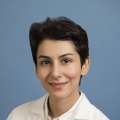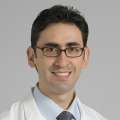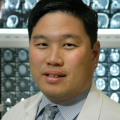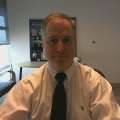UCLA Health Comprehensive Stroke Center
At the UCLA Health Stroke Center, patients have access to world-class, comprehensive stroke care.

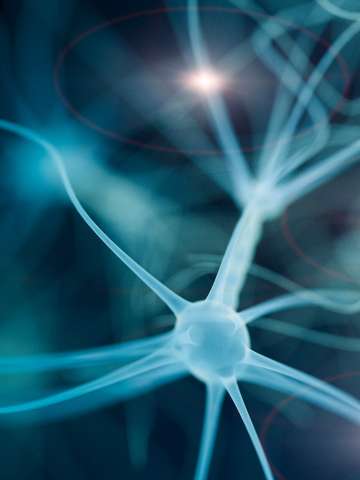
Why choose UCLA Health for stroke care?
The UCLA Health Comprehensive Stroke Center is among the leading centers worldwide for stroke care and research. We offer comprehensive, state-of-the-art treatment for all types of strokes and conditions affecting blood flow to and within the brain.
Additional highlights of our program include:
National recognition: Our program has achieved national recognition as a leader in stroke care from the University Health Consortium. We are also a designated Specialized Program of Transitional Research in Acute Stroke (SPOTRIAS) Center, funded by the National Institute of Neurological Disorders and Stroke (NINDS). These designations mean our team of experts offers exceptional, research-driven stroke care.
Highest quality of care: We are proud to be the only stroke center in Los Angeles County designated as a Joint Commission Advanced Comprehensive Stroke Center — the highest level of stroke care certification.
This recognition signifies that we meet the nation’s most rigorous standards for quality and safety, and that we are fully equipped to manage the most complex stroke cases, including large vessel occlusions, hemorrhagic strokes, and post-stroke complications.
Comprehensive services: Our stroke specialists work with experts in emergency medicine, neurosurgery, interventional neuroradiology, neurointensive care, stereotactic radiology, neuroanesthesiology and rehabilitation neurology. Our specialists offer inpatient and outpatient services so that patients can access the full spectrum of stroke care.
Emphasis on research: Our strong research emphasis means we offer patients the most promising, latest treatment approaches. Our clinicians continually learn more about the best stroke treatments and use their knowledge in real time to improve care.
History of innovation: UCLA Health’s dedicated acute stroke unit was the first of its kind in California and one of the first in the nation. We have developed leading therapies that are now used worldwide, including specific clot-busting medicines. Also, we were the first medical system in the western United States to offer a mobile stroke unit.
Our programs and services
We treat patients through the entire spectrum of care. Our services include:
UCLA Health Stroke Center: We coordinate each patient’s care from the first moment of contact, whether through the emergency department or an outpatient clinic. An entire team in the Stroke Center collaborates to treat patients, from emergency intervention to rehabilitation.
Emergency care: Our Brain Attack Team provides 24/7 emergency stroke treatments. When a patient comes to Ronald Reagan UCLA Medical Center with a stroke, they are admitted to our dedicated, state-of-the-art acute stroke unit. Our team immediately starts treatment to reduce brain damage as much as possible.
UCLA Health Mobile Stroke Unit: We were the first health care system in the western United States offering a mobile stroke unit. This unit is part of the Arline and Henry Gluck Stroke Rescue Program, which expands care access for patients in Los Angeles County. The mobile unit is an ambulance with special equipment for managing stroke. It includes a mobile CT scanner, lab tests, telehealth connection to a hospital and emergency medications. Research shows that the sooner patients receive stroke care, the better their health outcomes. We partner with local fire departments and emergency medical services as part of the 911 emergency response system.
UCLA Health Stroke and Vascular Neurology Outpatient Clinic: We provide comprehensive care for cerebrovascular conditions. Our specialists evaluate, diagnose and treat all types of disorders that affect the brain’s blood vessels or blood flow.
Edie Baskin Bronson and Richard Skip Bronson Cerebral Blood Flow Laboratory: Specialists in the cerebral blood flow lab use advanced imaging tools to evaluate blood flow in the brain. The equipment in the laboratory is portable, so we can also use it in the operating room, emergency department and intensive care unit (ICU). Our laboratory is one of the busiest clinical and research labs of its kind in the world.
UCLA Health TeleStroke Program: We offer direct, immediate video stroke consultations to emergency departments at community hospitals. We work with local neurologists to offer coverage 24 hours a day, 365 days a year. This service gives emergency departments across the country access to our certified, world-class stroke center and services.
Types of strokes and vascular neurology conditions we treat
The vascular neurology team treats a wide variety of conditions. Our stroke specialists treat:
Ischemic stroke occurs when there’s a sudden blockage in one of the blood vessels supplying blood to your brain. An ischemic stroke often happens when a blood clot forms in one of these blood vessels. This type of stroke accounts for 87% of all strokes.
Hemorrhagic stroke is far less common. It occurs when there’s sudden bleeding in the brain, often from a burst artery or bulge in one of the brain’s blood vessels (aneurysm).
Transient ischemic attack (TIA) is a sudden, temporary interruption of blood flow in the brain. It causes stroke-like symptoms, but a TIA is not a stroke. Instead, it can warn of an impending stroke. TIAs may be treated with medications or lifestyle changes to help improve blood flow in the brain.
Our vascular neurologists (stroke doctors) also provide treatment for any condition that affects blood flow in the brain (cerebrovascular conditions). Additional common cerebrovascular conditions include:
Arteriovenous malformation (AVM) is a cluster or tangle of blood vessels. It may cause bleeding in the brain, seizures or stroke-like symptoms.
Brain aneurysm is an irregular bulge in one of the brain’s blood vessels. It typically doesn’t cause symptoms. But if an aneurysm bursts, it can cause bleeding in the brain (hemorrhage).
Carotid artery stenosis is narrowing in the blood vessels that carry blood to the brain (carotid arteries). The carotid arteries are located on both sides of the neck. Often, a buildup of a fatty substance (plaque) causes the narrowing. Over time, the plaque can harden and lead to a condition called atherosclerosis.
Cavernous hemangioma is an abnormal cluster of the tiny blood vessels (capillaries) connecting veins and arteries. The mass may cause seizures, vision changes or other stroke-like symptoms such as slurred speech or muscle weakness.
Dural arteriovenous fistula is an AVM that occurs in the thick tissue that covers the brain (dura mater). It may form after an injury or infection. A dural arteriovenous fistula may cause vision changes, ringing in the ears or headaches.
Moyamoya disease is a rare disorder in which the carotid arteries narrow or become blocked for unknown reasons. Carotid artery blockages can cause disruptions in blood flow that lead to a stroke.
What are the signs of a stroke?
Strokes require emergency treatment. If you notice stroke symptoms in yourself or another person, call 911 right away.
Strokes can cause confusion, headaches or difficulty walking. You can also use the acronym F.A.S.T. to help you remember the common signs of a stroke and the importance of seeking help:
- Face drooping
- Arm weakness
- Speech slurring
- Time to call 911
Tests and treatments stroke specialists offer
Our stroke team uses the full range of diagnostic tools and treatment options to provide care efficiently and effectively. We aim to diagnose a stroke or cerebrovascular problem as quickly as possible so we can deliver accurate, timely treatments.
Stroke diagnosis
Diagnostic tests tell specialists about stroke location and severity. We use a full range of diagnostic tools, including:
Los Angeles Motor Scale (LAMS) is a three-item screening test that allows emergency responders to identify the severity of a stroke quickly. This test, developed at UCLA Health, can identify the severity of a stroke to ensure timely and effective triage, treatment, and improved outcomes for stroke patient.
Imaging tests, such as CT scans or MRIs, provide detailed brain images.
CT or MRI angiograms allow specialists to view blood flow in the brain.
Doppler sonography (carotid ultrasound) uses sound waves to view the carotid arteries. Blocked carotid arteries can cause a stroke.
Transcranial Doppler (TCD): TCD is a fast, non-invasive ultrasound that measures blood flow in the brain’s major arteries. It helps detect large vessel blockages, monitor for re-occlusion, and guide treatment.
Heart tests, such as an electrocardiogram or echocardiogram, can help determine if changes in the heart’s valves or rhythm could have led to a stroke.
Emergency stroke treatments
When treating a stroke, minutes matter. Usually, the first line of treatment is emergency interventions to reduce damage in the brain. Emergency treatments may include:
Clot-busting medicines: These medications break up clots from an ischemic stroke and reduce brain damage. Clot-busting medicines work most effectively when given within 4.5 hours of the start of a stroke.
Clot-retrieval device: This device quickly removes blood clots. Using a small, hollow tube (catheter) threaded through the blocked blood vessel, a stroke specialist places the device near the clot. When in position, the device attaches to the clot and pulls it out. Stroke specialists often use the device along with clot-busting medicines.
Medicines to reduce brain swelling: Stroke specialists may give drugs intravenously (through an IV) to reduce brain swelling. These medications can be especially effective after a hemorrhagic stroke.
Medicines to protect the brain: Also called neuroprotective medicines, these drugs protect the brain from lack of oxygen and further damage.
Life support measures: Patients may need help breathing with a ventilator. Or they may need IV fluids, nutrition or help managing blood pressure.
Craniotomy: A neurosurgeon may perform this brain surgery to relieve pressure in the brain, stop bleeding or remove blood clots.
Stroke prevention and vascular neurology treatments
We also provide a range of treatments to prevent stroke in high-risk patients or treat other conditions affecting blood flow in the brain. Treatments include:
Medicines: Some patients may benefit from blood-thinning medications, such as anticoagulants or antiplatelets. Others may also take drugs to control blood pressure or cholesterol or to manage heart conditions.
Neurovascular surgery: Some surgeries can help reduce stroke risk. Surgeons may perform a carotid endarterectomy to remove plaque from the carotid artery. They may place a small tube (stent) to keep the carotid artery open. Patients may also have surgery to repair an aneurysm or close a part of the heart called the left atrial appendage to reduce stroke risk.
Interventional neurovascular surgery: Interventional procedures use small, hollow tubes (catheters) and tiny tools to close or open blood vessels. We may use these procedures to treat other cerebrovascular conditions such as growths in the blood vessels (vascular malformations) or brain tumors.
Stereotactic radiosurgery: This treatment uses safe doses of radiation to target abnormal clusters of blood vessels (arteriovenous malformations). Surgeons may use stereotactic radiosurgery instead of traditional surgery. Or they may use it to shrink an AVM before surgery.
Quality Outcomes
The UCLA Stroke Program strives to provide quick and effective treatment after diagnosing a patient with stroke. It is important to us that patients receive appropriate treatment quickly when they come to the hospital, and that they continue their path to healing when they leave. Therefore, we are dedicated to compliance with core stroke quality measures to ensure we are meeting the highest standards for stroke centers, such as:
- Antithrombotic therapy
- Patients receive treatment to prevent blood clots forming within two days of arriving at the hospital.
- Patients receive a prescription medication to prevent blood clots from forming before leaving the hospital.
- Patient education
- Patients receive individualized education about their risk factors for stroke during their stay at the hospital.
- Thrombolytic therapy
- Patients who have a stroke because of a blood clot receive treatment within 60 minutes of arriving at the hospital.
For a full list of measures and detailed descriptions of what each one means, visit the American Heart Association website: https://qualitynearme.heart.org/GWTGPublicReporting (search for Zip Code - 90095, Radius - 5 miles, Disease State - Stroke)
Quality Metrics
| RR UCLA | |
|---|---|
| Ischemic Stroke Treatment | |
| 2024 Door to treatment with intravenous thrombolytic (median minutes) | 34.5 |
| 2024 Door to groin puncture (median minutes) | 81 |
Ischemic Stroke Treatment:
Door to treatment with intravenous thrombolytic time is defined as patients arriving to the Emergency Department with stroke symptoms who meet the criteria to receive intravenous thrombolytics to dissolve a blood clot in the brain. Lower times are better.
Door to groin puncture:
Door to groin puncture time is defined as the initiation of endovascular treatment for ischemic stroke patients arriving to the Emergency Department who meet the criteria to receive endovascular stroke treatment. Lower times are better.
Meet our team
Our stroke specialists (vascular neurologists) are experts in advanced treatments for stroke and other cerebrovascular conditions. They continually research, innovate and implement the latest techniques in stroke care.
Directors

Jeffrey L. Saver, MD, FAHA, FAAN, FANA
Professor and Senior Associate Vice Chair for Clinical Research Carol and James Collins Chair,
Department of Neurology Director, UCLA Comprehensive Stroke and Vascular Neurology Program David Geffen School of Medicine at UCLA
Dr. Saver is SA Vice-Chair and Professor of Neurology at UCLA, and Director of the UCLA Comprehensive Stroke and Vascular Neurology Program. He trained at Harvard Medical School, the Harvard-Longwood Neurology Training Program (neurology), the University of Iowa (neurobehavior), and Brown (vascular neurology). Author of over 670 research articles, 2 books, and 40 book chapters, Dr. Saver’s research interests are in acute stroke treatment, stroke prevention, neuroimaging, clinical trial design, and neurocognitive consequences of stroke. He served as PI of the NIH-NINDS FAST-MAG trial, Global Co-PI of the SWIFT PRIME trial, and Chair of the American Heart Association Stroke Council. He is currently Associate Editor at JAMA, the Journal of the American Medical Association, and Editorial Board Member at the journal Circulation. Dr. Saver is a recipient of the Feinberg Award from the American Stroke Association, the Distinguished Scientist Award from the American Heart Association, and the Lifetime Research Award from the World Stroke Organization.

Latisha Sharma, MD, FAHA
Professor of Neurology
Walter Brutsch Endowed Chair
Director, UCLA Health Comprehensive Stroke and Vascular Neurology Center
Director, Stroke Center Medical Quality
Director, TeleStroke Program
Dr. Sharma is a Professor of Neurology at UCLA and the Walter Brutsch Endowed Chair. Dr. Sharma holds program appointments as Director of the UCLA Health Comprehensive Stroke and Vascular Neurology Center, Director of UCLA Stroke Center Medical Quality and Director of the UCLA TeleStroke Program. She is a Fellow of the American Heart Association. She is a past recipient of the American Academy of Neurology Clinical Research Fellowship Award and the American Heart Association Bugher Foundation Award. Dr. Sharma’s clinical interests include cerebrovascular disease, stroke, simulation medicine, pediatric stroke, stroke in young adult, telestroke and stroke prevention.
Stroke Program Manager

Kayla Kilani, MPH, RN, BSN, PHN, MICN
Kayla Kilani, MPH, RN is a registered nurse with over 19 years of experience. She earned her Bachelor of Science in Nursing from California State University, Chico, and a Master of Public Health in Health Policy and Management from UCLA.
Kayla developed her clinical expertise in Emergency Nursing at an academic Level 1 Trauma Center serving both adult and pediatric populations, with specialization in STEMI care, comprehensive stroke, and pediatric emergency services at UCLA. For the past seven years, she has served in leadership roles focused on critical care and prehospital stroke response.
She is currently the Stroke Program Manager for UCLA Health and Nurse Manager for the UCLA Health Mobile Stroke Unit, where she leads both strategic development and clinical operations. Her expertise includes Lean management (certified), process improvement, and quality initiatives aimed at enhancing care coordination and patient outcomes.
Kayla is deeply committed to transforming stroke care delivery and advancing Mobile Stroke Units as a national standard of care.
Faculty
Contact us
Call 310-825-2631 to learn more about stroke prevention and treatment at the UCLA Health Stroke Center.
Stephanie Wong
Stroke Program Administrative Assistant
UCLA Comprehensive Stroke Center
[email protected]
Find Your Care
Our specialists offer the full range of inpatient and outpatient stroke and vascular neurology services.
To learn more, please call 310-794-1195.
